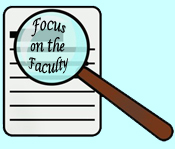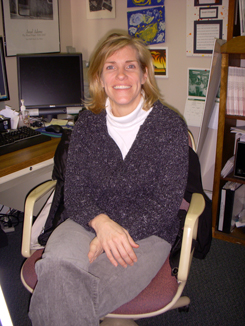Department of Psychology


Cindi May, an Ohio-born psychology professor at the College of Charleston, stumbled upon a passion for psychology during elective psychology classes at Furman University, where she earned her undergraduate degree.
May originally planned to pursue an English degree, since she aspired to be a high school English teacher. After Furman, May moved on to Duke to earn her doctorate. Her choice to attend Duke was based on the fact that she had a large interest in cognitive aging and one of the leaders in the field taught at Duke during that time.
May began her teaching career at the University of Arizona, and she secured two research grants there. Due to her passion for undergraduate teaching, May left the University of Arizona to come to the College of Charleston.
"I had always envisioned myself as being a mentor for undergraduate students and I wanted to move to a place where I could incorporate undergraduate teaching with my research," May said.
She moved to the College of Charleston in 1999, finding, she says, her perfect fit. May loves teaching at the College because she can interact with her students in the classroom, but especially loves being able to involve her students in her research.
May teaches Psychology Intro Honors, Cognitive Psychology, Cognitive Lab, and Adult Aging courses.
Sometime in the near future she hopes to develop a class on advanced human memory. She would also like to jump start a class that focuses on critical thinking, designed to help students understand why smart people often make poor decisions, deliver faulty judgments, and hold erroneous beliefs. Students will come to understand how the human mind falls prey to errors in thinking, and hopefully will at least learn to recognize these mistakes if not avoid them all together.
May says she does not have a favorite course to teach. She likes any course that engages students beyond the textbooks and readings where they can relate the material to their own lives.
May is currently working on two lines of research, both of which are trying to enhance everyday cognitive functioning for individuals, especially those who face cognitive challenges. May hopes to enhance cognition, which is our intellectual functioning, by improving memory, attention, comprehension, and decision making.
The first line of research examines cognitive aging and challenges faced by healthy, older adults with respect to memory and attention. The second line examines inclusive education and challenges that are faced by individuals with disabilities, and the benefits derived from inclusive education not only for people with disabilities, but all people involved.
May has also been working on researching cognitive deficits among age groups for quite some time. Her latest research examines the interplay between emotion and memory, with an emphasis on developing ways to use emotion to enhance memory performance.
"The main goal of my research is to contribute in a meaningful way both to our scientific understanding and to everyday application with respect to cognitive challenges," May said.
She has published several journal articles in the past few years that examine cognitive aging. May is currently working on a manuscript that demonstrates the benefit of inclusive education for traditional students. Some of her research is conducted with faculty members from this university and others, but most of her research is completed with undergraduate students here at the College of Charleston. Even though May has done the majority of her research on adults, both young and old, she has a great deal of interest in researching young children. May takes a lifetime approach in her research and tries to research all ages.
May's plate is full with teaching and research projects, but also makes time to spend with her husband and four children. May says she is very busy juggling all these things, but it makes her life incredibly interesting. She believes that teaching helps her be a better mother, and being a mother has made her a much better teacher.
She has 10-year-old twins, and 7-year-old triplets. In 2006, one of her triplets (Grace) was diagnosed with leukemia and passed away just six weeks later. Grace had Down Syndrome, and May's experience with Grace sparked an interest in inclusive education, which integrates students with disabilities in regular classes. She used research on inclusion to develop a program with Dr. Fran Welch, Dean of the College's School of Education, Health, and Human Performance and others called REACH (Realizing Educational and Career Hopes).
REACH strives to include students with intellectual disabilities in classes, athletic teams, and clubs. May initiated a similar program at a local high school three years ago, and REACH will begin at the College of Charleston in Fall 2010.
Will May's academic work ever come to a conclusion? Probably not. She has been building on her research for 20 years and has no plans of stopping now. The more she discovers, the more questions she has.
Cindi May is busy to say the least, but enjoys every minute of her profession. You can learn more about May's program REACH at https://blogs.cofc.edu/life, and more about Cindi May at https://blogs.cofc.edu/mayc.
###